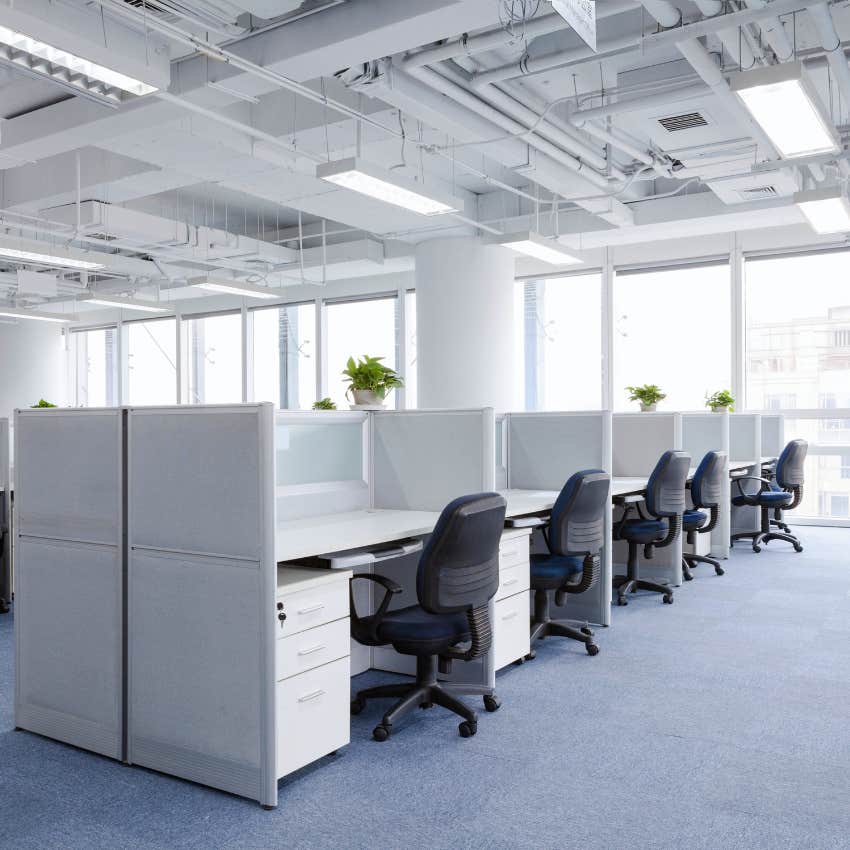When A Computer Company Told Workers They'd Be Punished If They Didn't Return To Office, Nearly Half Chose The Punishment
They decided they're fine with Dell's punitive promotion policy if it means continuing to work from home.
 Dragos Condrea / Getty Images / Canva Pro
Dragos Condrea / Getty Images / Canva Pro The more companies try it, the more obvious it becomes: Workers want nothing to do with return-to-office mandates, and not even money is enough to persuade many of them.
Recent data leaked from the Dell computer company puts an even finer point on it: Threats don't work either.
After the company issued a draconian and punitive return-to-office mandate in February 2024, the results are in — and much of the company's staff was totally unmoved.
Nearly half of workers called Dell's bluff on its return-to-office threats.
Dell made national news earlier this year when it put a whole new spin on the return-to-office mandate that made even WebMD's now notorious and viral-for-all-the-wrong-reasons RTO seem chill by comparison.
Dell told its employees that they could keep working from home if they wanted, but they would be ineligible for promotions or new positions unless they agreed to a hybrid schedule that required them to be in the office three times a week.
The mandate generated tons of bad press — in part because CEO Michael Dell had previously been one of the loudest voices in the business world championing work-from-home schemes during the pandemic, saying that remote work was "here to stay."
How quickly he capitulated. Speaking anonymously to media outlets, Dell employees made it known that they were furious with the new rules, expressing that they felt like their future advancement in their careers was being held hostage for an utterly unnecessary RTO.
It's hard not to agree with them. A computer company, of all things, suddenly being anti-remote work is pretty much beyond parody. And internal data from Dell tracking its RTO process, which was leaked to Business Insider, shows how it has shaken out. Suffice it to say, it has backfired.
Nearly half of Dell's U.S. staff and a third of its international staff have chosen to continue working from home despite Dell's punishment.
Dell's policy requires workers to register as either remote or hybrid. The latter requires them to work 39 days per quarter in an "approved office," which the corporation said would improve its company culture. A color-coded system monitors workers' whereabouts to ensure compliance.
It has been, by pretty much any perspective, a failure. The leaked data Business Insider saw revealed that nearly 50% of U.S. employees have refused to be swayed by Dell's threats, and a third of its overseas staff has as well. Basically, it has shaken out pretty much exactly as was predicted by many business and company culture experts.
Anecdotal accounts from 11 employees who also spoke to Business Insider confirm the data, with some even making it sound like the numbers have underestimated how poorly the RTO mandate has worked. One employee reported that "almost 90%" of their team, which is "spread all over the world," opted to remain remote because "there was no real advantage going to the office."
 Drazen_ / Getty Images Signature / Canva Pro
Drazen_ / Getty Images Signature / Canva Pro
Making Dell's RTO even sillier is the number of employees who reported having reclassified as hybrid only to show up to empty offices to have video conferences with colleagues who are also in empty offices. Sillier still are those who reported they had no office to even return to because the company had shut their office down in 2020.
Employees cited everything from work-life balance to financial considerations as things worth more to them than a promotion at Dell.
Dell surely expected a different outcome, but the workers who spoke out said the reasons for the results were very simple. "I benefited a lot from being WFH since 2020 and had a lot of personal growth," one employee said. "I'm not willing to give that up if I don't have to."
Most cited work-life balance issues as motivating their refusal to accept Dell's terms, from being able to pursue hobbies to feeling more equipped to start a family. Worker after worker said the positive changes work-from-home brought were simply worth more to them than being able to be promoted.
Others cited financial considerations, saying that returning to the office basically constituted a salary cut. Studies have shown that many employees feel this way, and it's far more than just mere perception. One study found that returning to the office costs workers the equivalent of a month's worth of groceries on average.
 beijingstory / Getty Images Signature / Canva Pro
beijingstory / Getty Images Signature / Canva Pro
This is due in part to commuting costs, which run the average U.S. worker $8466 a year. But the list of costs returning to the office slaps workers with is far longer than just commutes, from extra groceries for packing lunches to having to hire domestic or childcare workers.
Dell has repeatedly said its RTO mandate was initiated for the purpose of promoting collaboration and company culture, but it's impossible to justify that when in practice, Dell employees are working on multinational teams in empty offices — and upending their lives and shelling out money in order to do so.
As one Dell employee put it to Business Insider, "The reality of this thing is dumb." Here's hoping other companies will learn from Dell's mistake.
John Sundholm is a news and entertainment writer who covers pop culture, social justice, and human interest topics.

